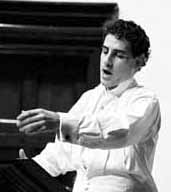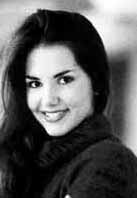REVIEWS
Recital Wigmore Hall, London 15 November 2002
In Recital: London, Opera Now, March/April, 2003
Juan Diego Flórez, Vincenzo Scalera, Wigmore Hall, Seen & Heard, 17 November 2002
Juan Diego Flórez Concert, Wigmore Hall, The Times, 18 November 2002
Powerful Peruvian should stick to the Italians, Evening Standard, 18 November 2002
________________________________
In Recital: London
John Steane, Opera Now, March/April, 2003
Is it still 'ladies first'? Probably not, yet it seems churlish to put so charming a newcomer as the young soprano, Laura Giordano, second to anybody, even if he is Juan Diego Flórez. Both gave solo recitals within a few days of each other, and without knowing who should have precedence, I shall review them together. They have much in common. For instance, Giordano, bright of tone in the traditional Italian manner, opened with some magically soft singing as though to anticipate and assuage misgivings that she was going to be another of those pert Latin soubrettes with voices sharp as needles and personalities to match. She sang her first phrases dolcissimo, pianissimo, and made of Cesti's 'Intorno al idol mio' an exquisitely tender song to the breezes. In similar mood, Flórez began his recital with the gentlest of tones in a villanella by Andrea Falconieri: it was exactly what we wanted to hear from him, reassurance that a gentler, candlelit beauty was also within the range, of this brilliant voice with its keen penetration. He went on to sing lightly with a fine legato in Gluck's well known 'O del mio dolce ardor', and then with the deployment of full virtuoso skills, he led into the rarely heard bravura aria in the Paris version of Orpheus. The counterparts in Giordano's programme were a charmingly turned 'Pur Dicesti (Lotti) and a formidable aria from Vivaldi's Olimpiade. Flórez went further to establishing serious musical credentials in Mozart's 'Misero O sogno', carefully studied and comparable in many ways to the fine Mozart tenor of earlier years, Leopold Simoneau. In the second half a varied selection of songs, including some French gave way to opera for encores: some delicately shaded Puccini for Giordano and the hoped-for Rossini and Donizetti (with all those nine high Cs) from Flórez. Vincenzo Scalera accompanied on both occasions with unvarying skill. Giordano was making her London debut as a recitalist in the prized Rosenblatt series at St. John's, Smith Square; Flórez was singing for the first time at the Wigmore Hall. There the season has the melancholy distinction of being its Director, William Lyne's last. Flórez' recital was a splendid adornment [...]
Juan Diego Flórez, Vincenzo Scalera, Wigmore Hall
Melanie Eskenazi, Seen & Heard, 17 November 2002
Start with the High Cs and work your way down from there. or at least
you can if you didn't scuttle out before the final encore and the
(genuine) standing ovation, since Flórez concluded his Wigmore Hall
debut with a performance of 'Ah! Mes Amis, Quel Jour de Fête' (from La
Fille du Régiment') which had connoisseurs of vocal art making such
statements as 'Even Pavarotti in his prime never sang it like that!'
Indeed not, and it is fitting to begin a review of this recital with the
encores, since it was here that Flórez showed that he really is fit to
be mentioned in the same breath as some of the legendary tenors of the
past. I recall fulminating about someone once having written that what
was, in fact, a fairly mediocre recital represented 'utterly perfect
singing' and spluttering something like 'This is not perfect singing!
Tito Schipa singing 'Una Furtiva Lagrima,' that's perfect singing!' So
was Flórez' rendition of this piece - not simply for its bravura high
notes but for the finesse of the phrasing, for the exquisite fil di
Voce, and for the way in which he made the character come alive through
the music.
The first of the encores found Flórez on his home ground. 'Cessa di piu'
resistere' is a fiendishly difficult piece to sing at any stage of an
evening, but it was here that he really began to win over his audience,
who had previously responded to him with enthusiasm but not fervour. As
I have previously remarked, he delivers the coloratura with a wonderful
ringing quality in the sound, but what really marks him out as special
is his complete accuracy, with nothing aspirated, glossed over or
skimped. 'E tu, infelice vittima' was particularly finely phrased, and
the whole aria had that sense of power in reserve which delineates his
singing.
It was worrying that very little notice had been given of the planned
programme, which seemed to have been chosen to display his versatility
rather than his trump card, perhaps not the wisest of plans for a major
début. It was clear that he was not as much at home with some of the
music as he was in Rossini and Donizetti, and whilst I admit that the
use of a score is something of a bête noire with me, I am certain that
he only sang at his best when he was able to dispense with one. This he
was able to do during the Peruvian songs, which may not be of the most
elevated musical quality but nevertheless possess tremendous charm when
sung with such poise, assurance and genuine warmth: Valcárcel's 'Suray
Surita' showed both voice and person opening out and communicating with
the audience, something Flórez had found it much harder to do during his
groups of Arie Antiche, although these provided some exquisite singing.
Bellini's 'Ma rendi pur contento' was sung with unaffected directness
and clarity, the tone ravishingly smooth and the phrasing elegant, and
'L'amor funesto' demonstrated consummate breath control as well as
expressive warmth; Scalera played the lovely accompaniment here with
great delicacy, a feature not always evident in his performance. Flórez
was less successful in the French group; his enunciation is crisp and
his phrasing idiomatic, but he takes rather too operatic a tone for such
languid pieces as 'Après un rêve,' although Massenet's 'Ouvre tes yeux
bleus' was sung with style and grace.
Flórez' voice is a fine instrument of great beauty, if not as
immediately compelling as that of Pavarotti; there is a slightly nasal
quality at times, and his line can tend to fade a little at the centre,
but what he does share with Pavarotti is a truly exciting attack -
phrase after phrase is sung as though the tenor were snapping at its
heels, and he actually sounds hungry for the words at times. The same
verve and precision is shown in his approach to high notes, especially
in pieces such as 'Ah! Mes Amis,' where every high C was hit right in
the middle, without even a hint of an approach from below, and where he
had enough resources left to give point to the words, even at the end of
very taxing lines. His special quality, however, is not just this
technical assurance but the combination he offers of seamless
coloratura, superb diction, tenderness of phrasing and winning stage
presence; there's no doubt that his ideal platform is the operatic
stage, and although much of this recital gave great pleasure, it was the
arias by Rossini and Donizetti which really revealed him as a highly
individual artist, and no connoisseur of this kind of music who heard
him sing such lines as 'Et ce doux espoir de bonheur /Trouble ma raison
et mon Coeur' on this occasion, could possibly doubt his star quality.
Juan Diego Flórez Concert, Wigmore Hall
Hilary Finch, The Times, 18 November 2002
As the queue snaking all round the Wigmore Hall and back again attested,
the Peruvian tenor Juan Diego Flórez no longer needs to prove himself.
So, as the fourth, fifth, sixth tenor - I lose count - Flórez could now
put together a recital programme shaped by lesser known names such as
Falconieri, Porpora, Valcárcel. In fact, you almost needed a magnifying
glass to find the Bellini and Donizetti which shot him to fame.
But this confidence didn't quite extend to the notes themselves. For
even the tiniest Neapolitan ditty, the most tried and tested warm-up
aria antiche, the music-stand and the score were there. This seemed
strange for a singer who prides himself on the rapid learning and
memorisation of major operatic roles; and, to be honest, Flórez's
accompanist, Vincenzo Scalera, didn't sound over-prepared either.
But, if the voice is what you are after, then the voice is what you get.
The "beautiful tresses" serenaded by the 17th-century Neapolitan
lutenist, Andrea Falconieri, were caressed by the light-filled legato of
that shining tenore di grazia. And, as Gluck's ardour and hope warmed
the music of the 18th century, so Flórez's tenor caught fire, darting
with the flames of L'espoir renait de mon ame from the French Orphée et
Eurydice.
This is just the repertoire that one had hoped Flórez might follow, with
his supple, sentient tenor. But, as yet, he sings it almost carelessly,
deaf to its understatement and emotional economy. And it sounds, well,
almost like anything and everything else.
He surges to fortissimo at the top of a voice which ricochets off the
ear-drums even in the back row; he emotes infallibly mid-phrase; and he
fades out rather elegantly tapering the end of a line.
At last a sense of distinctive idiom appeared in three Peruvian songs.
Flórez again capitalised on his highly charged fast vibrato and plangent
pianissimo. But now the voice also eloquently incarnated the steady
undulations of The Wasteland of André Sas's El pajonal, and bounced and
jostled its way through the chattering words of La jarra de oro (The
Broken Pitcher). Three arias by Bellini and Donizetti confirmed what all
Flórez followers already knew; whereas Fauré's Après un reve revealed
alas that, for Flórez, this repertoire, too, can live by the voice
alone. Of course, it can't.
And not only true connoisseurs of the mélodie would have felt
short-changed. Bizet's Ouvre ton coeur bellowed forth and then,
adrenalin set speeding by the ovations, Flórez was tempted by Rossini's
Barbiere to play out the role of the caricature tenor, further embodied
in a furtiva lagrima well nigh sick of self love.
Powerful Peruvian should stick to the Italians
Stephen Pettitt, Evening Standard, 18 November 2002
A lot of fuss has surrounded Peruvian tenor Juan Diego Florez, and with
reason. He possesses a wonderful tenor, powerful and ringing yet smooth,
ideal for the Italian roles from Rossini to Puccini in which he's thus
far been cast. Those who came to this recital merely for that sound
will have been delighted.
But great voices do not necessarily great singers make. And those of us
hoping to witness an accomplished, insightful musician at work were
deeply disappointed. Florez sang everything from a 17th century aria to
pieces by Bellini (the ariettas Malinconia, ninfa gentile and Ma rendi
pur contento) and Donizetti (L'amor funesto) in exactly the same way. He
ignored the demand for subtle colouring, balanced phrasing and
microscopic attention to text in Mozart's concert aria Misero o sogno...
Aura che intorno spiri and a pair of opera arias by Gluck (O del mio
dolce ardor and L'espoir renait di mon ame from Orphee et Eurydice). At
less than a loud dynamic his tone quality faltered, which was of no help
here or in Faure's Apres un reve. And even on his home patch, in the Bellini and Donizetti, he conveyed one-dimensional emotion, a kind of caricatured, sentimental ardour that excluded all else. I think it was supposed to be sexy.
His career choice now is plain. Either he should take lessons in style and refine his musical thinking, or he should stick rigidly to the Rossini-to-Puccini patch, where he will further enhance his handsome reputation and vast income.
Vincenzo Scalera accompanied with servility, the piano propped up by the shortest available stick. That, I regret, said it all.


This page was last updated on: March 1, 2003